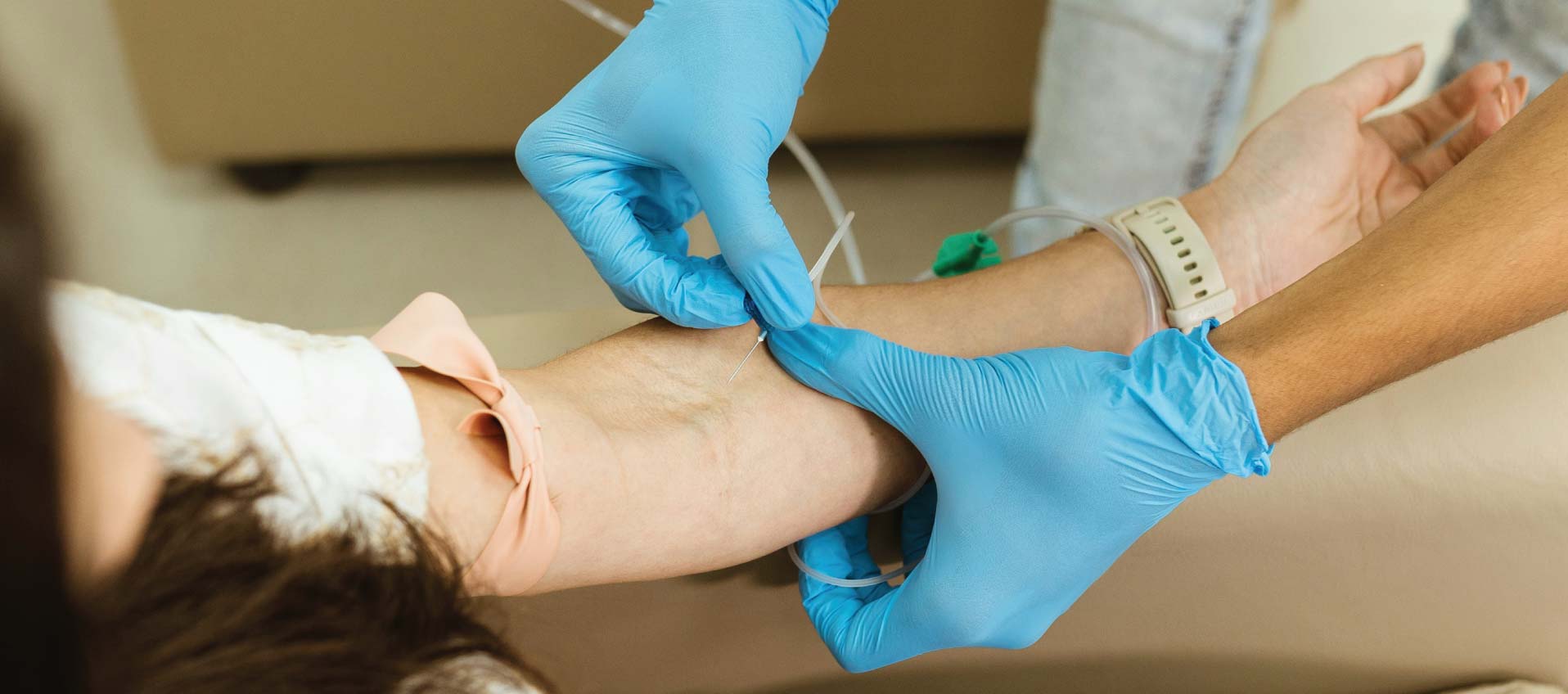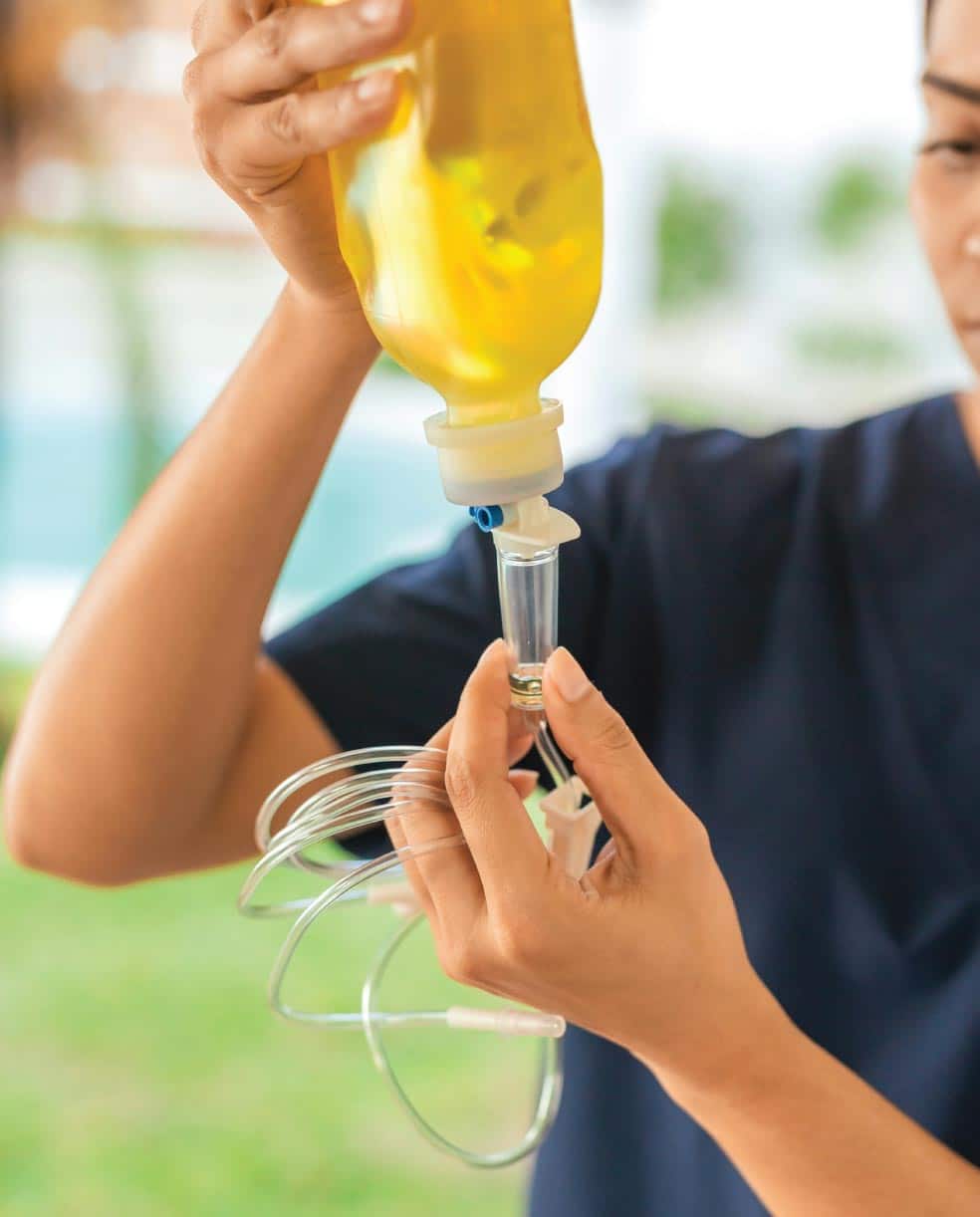Table of Contents
Can Urgent Care Give IV Fluids in Odessa, Texas – Priority ER 24/7
When dehydration strikes or illness depletes your body’s fluids, many patients wonder can urgent care give IV fluids for rapid recovery. At Priority ER in Odessa, Texas, our board-certified emergency physicians and skilled nursing staff provide comprehensive IV hydration therapy 24 hours a day, ensuring West Texas residents receive immediate fluid replacement when oral hydration isn’t enough to restore health and vitality.
Located at 3800 E 42nd St, Suite 105, our emergency room care facility serves Odessa, West Odessa, Midland, Gardendale, and surrounding Ector County communities with complete IV therapy capabilities far exceeding standard urgent care centers. Unlike basic urgent care clinics with limited IV services, Priority ER maintains multiple IV administration stations, comprehensive fluid options, and continuous monitoring equipment to safely deliver intravenous treatments for various conditions.
Common Reasons for IV Fluid Treatment at Priority ER (2024 Data)
IV fluid therapy represents one of medicine’s most effective interventions for rapid symptom relief. What might take hours to achieve through oral hydration can be accomplished in 30-45 minutes with IV fluids, making it invaluable for patients suffering from severe dehydration, vomiting, or conditions preventing oral intake.
Understanding IV Therapy in Urgent Care Settings
Intravenous fluid therapy delivers fluids, electrolytes, medications, and nutrients directly into the bloodstream, bypassing the digestive system for immediate absorption and effect. In West Texas’s challenging climate with extreme heat and physically demanding occupations, IV hydration often becomes necessary when dehydration overwhelms the body’s ability to recover through oral fluids alone.
Our laboratory testing services complement IV therapy by providing rapid electrolyte analysis, kidney function tests, and blood counts that guide fluid selection and administration rates. This comprehensive approach ensures patients receive precisely formulated IV solutions addressing their specific deficiencies rather than generic hydration that may not fully restore physiological balance.

Types of IV Fluids and Their Uses
Different medical conditions require specific IV fluid formulations to effectively restore hydration and electrolyte balance. Normal saline (0.9% sodium chloride) serves as the workhorse for general dehydration and fluid replacement, while lactated Ringer’s solution provides a more physiologically balanced option for patients needing comprehensive electrolyte replacement.
A Gardendale construction worker arrived after collapsing from heat exhaustion during a 105-degree workday. His blood pressure was dangerously low, and oral fluids induced vomiting. Two liters of cooled IV saline over 90 minutes completely restored his vital signs and eliminated all symptoms, allowing safe discharge home.
A Gardendale construction worker arrived after collapsing from heat exhaustion during a 105-degree workday. His blood pressure was dangerously low, and oral fluids induced vomiting. Two liters of cooled IV saline over 90 minutes completely restored his vital signs and eliminated all symptoms, allowing safe discharge home.
Specialized IV Solutions
Beyond basic saline solutions, Priority ER stocks specialized IV fluids including dextrose-containing solutions for hypoglycemia, banana bags (multivitamin-enriched fluids) for nutritional deficiencies, and custom electrolyte solutions for specific imbalances identified through laboratory testing.
Pediatric patients require careful IV fluid calculations based on weight and age to prevent fluid overload. Our emergency staff utilizes precise dosing protocols and specialized pediatric IV equipment ensuring safe hydration for children experiencing dehydration from gastroenteritis, heat exposure, or other conditions.
Medication Delivery via IV
IV access enables rapid medication delivery for conditions requiring immediate treatment. Anti-nausea medications, pain relievers, antibiotics, and migraine treatments achieve therapeutic levels within minutes when administered intravenously, providing relief far faster than oral medications.
Conditions Requiring IV Hydration
Multiple medical conditions benefit from or require IV fluid therapy when oral hydration proves insufficient or impossible. Severe vomiting and diarrhea from food poisoning or viral gastroenteritis rapidly deplete fluid reserves, creating dangerous dehydration that oral replacement cannot match due to continued losses.
Our urgent care IV services address heat-related illnesses common in West Texas summers, where outdoor workers and athletes frequently experience heat exhaustion requiring rapid cooling and fluid replacement. Migraine sufferers also benefit from IV therapy combining hydration with anti-nausea and pain medications for comprehensive symptom relief.
| Condition | IV Fluid Type | Additional Treatments | Expected Relief Time |
|---|---|---|---|
| Severe Dehydration | Normal Saline or Lactated Ringer’s | Electrolyte monitoring | 30-60 minutes |
| Food Poisoning | Normal Saline | Anti-nausea medications | 45-90 minutes |
| Heat Exhaustion | Cooled Normal Saline | Temperature monitoring | 60-90 minutes |
| Severe Migraine | Normal Saline | IV medications for pain/nausea | 20-45 minutes |
| Morning Sickness | Lactated Ringer’s | Vitamin B6, anti-nausea meds | 30-60 minutes |
IV Treatment Process at Priority ER
Our comprehensive IV therapy process begins with thorough medical evaluation to determine the underlying cause of dehydration and identify any conditions requiring specific fluid formulations. Unlike many urgent care centers offering limited IV services, Priority ER provides complete assessment including vital signs, laboratory analysis, and continuous monitoring throughout treatment.
The treatment process integrates nursing expertise with physician oversight, ensuring safe IV administration while monitoring for potential complications. Our emergency diagnostic imaging capabilities complement IV therapy when underlying conditions like kidney stones or intestinal obstruction contribute to dehydration, allowing comprehensive treatment of both symptoms and causes.
The ability to provide IV fluids represents a crucial difference between basic urgent care and emergency facilities. Many conditions causing dehydration also impair oral absorption, making IV therapy not just beneficial but essential for recovery. Proper IV access and monitoring capabilities save lives.
The ability to provide IV fluids represents a crucial difference between basic urgent care and emergency facilities. Many conditions causing dehydration also impair oral absorption, making IV therapy not just beneficial but essential for recovery. Proper IV access and monitoring capabilities save lives.
Patient Assessment and IV Protocols
Initial assessment focuses on identifying dehydration severity through clinical signs including skin turgor, mucous membrane moisture, blood pressure changes with position, and urine output. Laboratory tests revealing elevated blood urea nitrogen, creatinine, or hematocrit confirm dehydration severity and guide fluid volume calculations.
Our emergency physicians select appropriate IV gauge sizes based on patient needs and vein accessibility, with larger bore IVs enabling rapid fluid administration for severe dehydration. Ultrasound-guided IV placement ensures successful access even in patients with difficult veins due to dehydration or chronic medical conditions.
Initial Evaluation & Testing
Our medical team assesses dehydration severity, identifies underlying causes, and performs necessary lab tests. Vital signs and symptoms guide fluid selection and treatment planning. Visit our 24-hour urgent care facility any time for immediate IV therapy evaluation.
IV Access Establishment
Skilled nurses place appropriate IV catheters using ultrasound guidance when needed. Site selection considers fluid volume requirements and patient comfort during extended treatments.
Monitored Fluid Delivery
IV fluids administered at calculated rates with continuous vital sign monitoring. Nurses adjust flow rates based on patient response and physician orders throughout treatment.
Symptom Resolution & Home Care
Most patients experience significant improvement within one hour. Discharge includes hydration maintenance instructions and follow-up recommendations if needed.
Medical Assessment
Evaluation of dehydration severity and underlying causes requiring IV therapy.
IV Placement
Professional IV catheter insertion for safe fluid administration.
Fluid Administration
Monitored delivery of appropriate IV fluids and medications.
Recovery & Discharge
Symptom improvement assessment and home care instructions.
IV Administration and Monitoring
Safe IV fluid administration requires careful monitoring of infusion rates, patient response, and potential complications. Our nursing staff calculates precise flow rates based on patient weight, dehydration severity, and cardiovascular status, adjusting as needed throughout treatment.
Continuous Patient Monitoring
Throughout IV therapy, patients receive continuous monitoring including blood pressure, heart rate, oxygen saturation, and temperature. This vigilant observation allows immediate detection of fluid overload, allergic reactions, or other complications requiring intervention.
Regular reassessment during treatment guides decisions about fluid volume and administration rate. Our IV at urgent care protocols ensure patients receive optimal hydration without risks associated with excessive fluid administration, particularly important for elderly patients or those with cardiac conditions.
IV Site Care and Comfort
Proper IV site maintenance prevents infiltration, phlebitis, and infection during treatment. Our nurses regularly assess IV sites, ensure secure taping, and reposition patients for comfort during extended treatments while maintaining sterile technique throughout care.

Benefits and Important Considerations
IV fluid therapy offers numerous advantages over oral hydration, particularly for patients experiencing severe symptoms or unable to tolerate oral fluids. The direct bloodstream delivery bypasses gastrointestinal absorption issues, providing immediate hydration and electrolyte replacement that can dramatically improve symptoms within minutes rather than hours.
Beyond simple hydration, IV access enables simultaneous delivery of medications, vitamins, and nutrients addressing multiple symptoms concurrently. This comprehensive approach proves especially valuable for complex conditions like severe migraines, where IV fluids combined with medications provide superior relief compared to oral treatments alone.
Advantages of IV Fluid Therapy
The rapid symptom relief achieved through IV therapy makes it invaluable for patients suffering from severe dehydration effects including dizziness, weakness, confusion, and cardiovascular instability. Within 30-45 minutes, most patients experience significant improvement in energy levels, mental clarity, and overall well-being.
IV therapy also enables precise fluid and electrolyte replacement based on laboratory values rather than guesswork. Our laboratory testing services identify specific deficiencies, allowing customized IV solutions that restore optimal physiological balance more effectively than generic oral rehydration products.
Research demonstrates IV hydration achieves 100% bioavailability compared to 50-60% absorption rates for oral fluids in dehydrated patients. This efficiency difference becomes critical when rapid rehydration is necessary to prevent organ dysfunction or when ongoing losses exceed oral replacement capacity.
Research demonstrates IV hydration achieves 100% bioavailability compared to 50-60% absorption rates for oral fluids in dehydrated patients. This efficiency difference becomes critical when rapid rehydration is necessary to prevent organ dysfunction or when ongoing losses exceed oral replacement capacity.
Safety and Precautions
While IV therapy is generally safe, certain precautions ensure optimal outcomes and prevent complications. Patients with heart failure, kidney disease, or liver problems require careful fluid volume calculations and slower administration rates to prevent fluid overload and breathing difficulties.
Proper IV placement technique and site monitoring prevent infiltration injuries where fluids leak into surrounding tissues. Our experienced nursing staff recognizes early signs of IV complications, repositioning or replacing IVs as needed to maintain safe, effective fluid delivery throughout treatment.
IV Fluid Treatment Success Rates by Condition
When to Seek IV Fluid Treatment
Recognizing when dehydration requires IV intervention versus oral rehydration helps patients seek appropriate care levels. Certain symptoms indicate dehydration severity beyond what home remedies can address, necessitating professional medical evaluation and likely IV therapy for safe, effective recovery.
Immediate IV evaluation becomes necessary when experiencing persistent vomiting preventing fluid retention, dizziness or fainting when standing, rapid heartbeat with weakness, decreased urination or dark concentrated urine, or confusion and altered mental status. These symptoms indicate significant dehydration requiring rapid intervention to prevent complications.
| Symptom/Condition | Severity Indicator | Recommended Action | IV Treatment Likelihood |
|---|---|---|---|
| Vomiting | Cannot keep fluids down >6 hours | Urgent care or ER visit | Very High (90%+) |
| Diarrhea | Severe with dizziness/weakness | Same-day evaluation | High (70-80%) |
| Heat Exposure | Confusion, no sweating | Call 911 immediately | Critical (100%) |
| Decreased Urination | No urine >8 hours | Urgent evaluation needed | High (80%+) |
| Dizziness | Falls or near-fainting | ER evaluation recommended | Moderate to High (60-70%) |
| Fatigue | With other dehydration signs | Medical assessment advised | Moderate (40-50%) |
Patients often underestimate dehydration severity until symptoms become dangerous. The question isn’t just can urgent care give IV fluids, but rather when IV therapy becomes medically necessary. Any combination of persistent vomiting, altered mental status, or cardiovascular instability requires immediate IV intervention.
Need IV Fluid Treatment Right Now?
Priority ER provides immediate IV hydration therapy 24/7. Our emergency team is ready to help you feel better fast.
Conditions typically not requiring IV fluids include mild dehydration responding to oral fluids, brief stomach upset without persistent vomiting, or fatigue without other concerning symptoms. These situations often resolve with rest, oral rehydration solutions, and time without need for intravenous intervention.
Special populations including pregnant women, elderly adults, and those with chronic medical conditions should maintain lower thresholds for seeking IV evaluation. Our women’s urgent care services include specialized IV protocols for pregnancy-related dehydration, ensuring safe hydration for both mother and baby.

Patient Satisfaction – IV Fluid Treatment
Weekend athlete case: A 35-year-old Midland marathon runner collapsed after a training run in 98-degree heat. Arriving with severe cramping and unable to stand, two liters of IV fluids with electrolyte replacement over 90 minutes completely resolved all symptoms. He completed his marathon two weeks later thanks to learning proper hydration strategies.
Weekend athlete case: A 35-year-old Midland marathon runner collapsed after a training run in 98-degree heat. Arriving with severe cramping and unable to stand, two liters of IV fluids with electrolyte replacement over 90 minutes completely resolved all symptoms. He completed his marathon two weeks later thanks to learning proper hydration strategies.
Frequently Asked Questions About IV Fluid Treatment
| Question | Answer | Additional Information |
|---|---|---|
| Can all urgent cares give IV fluids? | No, many basic urgent cares lack IV capabilities | Priority ER offers comprehensive 24/7 IV therapy services |
| How long does IV treatment take? | Typically 30-90 minutes depending on fluid volume | Most patients feel significant improvement within 45 minutes |
| Does IV therapy hurt? | Brief pinch during insertion, then comfortable | Numbing spray available for sensitive patients |
| Can I drive after IV fluids? | Usually yes, once symptoms resolve | We assess each patient individually before discharge |
| How much do IV fluids cost? | Covered by most insurance plans | Self-pay options and payment plans available |
| Are IV vitamins available? | Yes, including B-complex and other supplements | Often added for migraine and fatigue treatment |
| Can pregnant women get IV fluids? | Yes, safely with appropriate monitoring | Common for morning sickness and dehydration |
| How soon will I feel better? | Many patients improve within 20-30 minutes | Complete recovery typically within hours |
Sources Used
- American College of Emergency Physicians – IV therapy statistics and treatment protocols
- American Academy of Family Physicians – Dehydration treatment guidelines
- National Institutes of Health – Clinical research on IV hydration effectiveness
- World Health Organization – Hydration assessment and treatment recommendations
Medical Disclaimer: This article is for informational purposes only and does not constitute medical advice. The information provided should not be used for diagnosing or treating health problems or diseases. It is not a substitute for professional medical care. If you have or suspect you have a health problem, you should consult your healthcare provider. Never disregard professional medical advice or delay seeking it because of something you have read in this article.
If you are experiencing a medical emergency, call 911 immediately or visit your nearest emergency room. For urgent but non-life-threatening conditions, Priority ER is available 24/7 at (432) 552-8208 or visit us at 3800 E 42nd St, Suite 105, Odessa, TX 79762.
Conclusion
Understanding can urgent care give IV fluids helps patients make informed decisions about where to seek treatment for dehydration and related conditions. Priority ER’s 24/7 emergency services, comprehensive IV therapy capabilities, and board-certified emergency physicians provide immediate hydration solutions when oral fluids aren’t enough to restore health and vitality in West Texas’s challenging environment.
Don’t suffer through severe dehydration, persistent vomiting, debilitating migraines, or heat-related illness when rapid relief is available. Whether experiencing symptoms from stomach flu, food poisoning, excessive heat exposure, or other dehydrating conditions, our emergency team stands ready to provide immediate IV therapy tailored to your specific needs. Call (432) 552-8208 or visit our facility at 3800 E 42nd St, Suite 105, Odessa, TX 79762 for immediate IV fluid treatment when hydration becomes urgent.